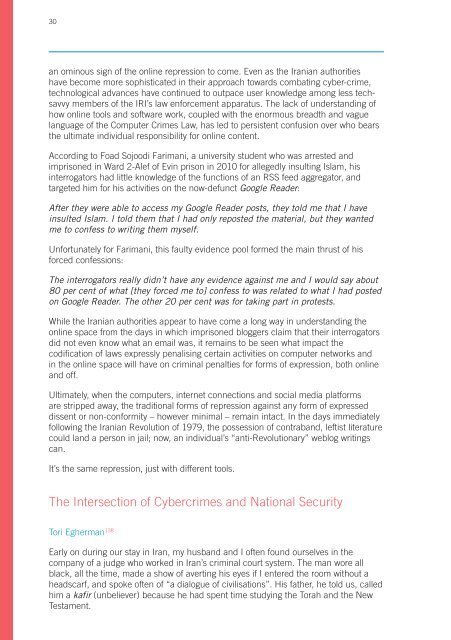1gjU5jn
1gjU5jn
1gjU5jn
You also want an ePaper? Increase the reach of your titles
YUMPU automatically turns print PDFs into web optimized ePapers that Google loves.
30<br />
an ominous sign of the online repression to come. Even as the Iranian authorities<br />
have become more sophisticated in their approach towards combating cyber-crime,<br />
technological advances have continued to outpace user knowledge among less techsavvy<br />
members of the IRI’s law enforcement apparatus. The lack of understanding of<br />
how online tools and software work, coupled with the enormous breadth and vague<br />
language of the Computer Crimes Law, has led to persistent confusion over who bears<br />
the ultimate individual responsibility for online content.<br />
According to Foad Sojoodi Farimani, a university student who was arrested and<br />
imprisoned in Ward 2-Alef of Evin prison in 2010 for allegedly insulting Islam, his<br />
interrogators had little knowledge of the functions of an RSS feed aggregator, and<br />
targeted him for his activities on the now-defunct Google Reader:<br />
After they were able to access my Google Reader posts, they told me that I have<br />
insulted Islam. I told them that I had only reposted the material, but they wanted<br />
me to confess to writing them myself.<br />
Unfortunately for Farimani, this faulty evidence pool formed the main thrust of his<br />
forced confessions:<br />
The interrogators really didn’t have any evidence against me and I would say about<br />
80 per cent of what [they forced me to] confess to was related to what I had posted<br />
on Google Reader. The other 20 per cent was for taking part in protests.<br />
While the Iranian authorities appear to have come a long way in understanding the<br />
online space from the days in which imprisoned bloggers claim that their interrogators<br />
did not even know what an email was, it remains to be seen what impact the<br />
codification of laws expressly penalising certain activities on computer networks and<br />
in the online space will have on criminal penalties for forms of expression, both online<br />
and off.<br />
Ultimately, when the computers, internet connections and social media platforms<br />
are stripped away, the traditional forms of repression against any form of expressed<br />
dissent or non-conformity – however minimal – remain intact. In the days immediately<br />
following the Iranian Revolution of 1979, the possession of contraband, leftist literature<br />
could land a person in jail; now, an individual’s “anti-Revolutionary” weblog writings<br />
can.<br />
It’s the same repression, just with different tools.<br />
The Intersection of Cybercrimes and National Security<br />
Tori Egherman 138<br />
Early on during our stay in Iran, my husband and I often found ourselves in the<br />
company of a judge who worked in Iran’s criminal court system. The man wore all<br />
black, all the time, made a show of averting his eyes if I entered the room without a<br />
headscarf, and spoke often of “a dialogue of civilisations”. His father, he told us, called<br />
him a kafir (unbeliever) because he had spent time studying the Torah and the New<br />
Testament.


